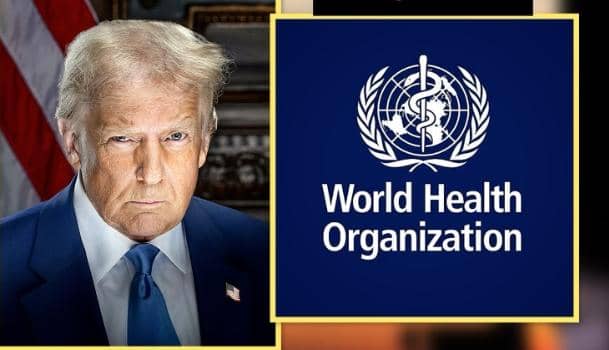By: Daure David
In a move that is expected to reverberate across the global health landscape, former President Donald Trump has signed an executive order that directs the United States to withdraw from the World Health Organization (WHO), an international body crucial for coordinating global health efforts. The withdrawal is a response to Trump’s longstanding criticisms of the WHO, particularly regarding its handling of the COVID-19 pandemic and what he called the organization’s political influence.
Trump’s executive order aims to “pause the future transfer of any United States Government funds, support, or resources to the WHO” and urges the identification of alternative international partners who can take over essential functions previously managed by the WHO. This development follows a history of sharp criticism from Trump, who had repeatedly accused the WHO of mishandling the pandemic and being overly influenced by China, especially in relation to the initial outbreak in Wuhan.
The United States, under Trump, had already begun the formal withdrawal process in 2020. However, the latest order, signed on January 20, 2021, marks the official revocation of a letter sent by the U.S. government that notified the UN Secretary-General of the withdrawal. The executive order also rescinds an earlier directive related to the U.S. government’s response to COVID-19 and its global health leadership role.
A White House statement addressing the withdrawal outlined several key reasons for the decision, including the WHO’s perceived failure to implement necessary reforms, its mishandling of the COVID-19 crisis, and the organization’s failure to remain independent from the political influence of member states. The statement also emphasized concerns over the disproportionate financial contributions required from the U.S., noting that despite having a significantly smaller population, China contributes far less to the WHO’s budget than the U.S.
“The United States noticed its withdrawal from the World Health Organization in 2020 due to the organization’s mishandling of the COVID-19 pandemic…and its failure to adopt urgently needed reforms,” the statement read. “In addition, the WHO continues to demand unfairly onerous payments from the United States, far out of proportion with other countries’ assessed payments.”
The move is expected to have significant ramifications for global health coordination. The U.S. has long been the largest financial contributor to the WHO, and its absence could disrupt efforts to address ongoing and emerging health crises. This could include initiatives aimed at combatting infectious diseases such as the newly emerging bird flu, for which the WHO had planned a meeting of member states to discuss coordinated actions.
Critics have warned that the withdrawal could undermine global efforts to combat future pandemics and jeopardize international cooperation on public health issues. With the U.S. no longer involved, other nations may face challenges in ensuring a unified and effective response to global health threats.
Furthermore, the Trump administration has announced plans to review and potentially rescind the Biden administration’s 2024 U.S. Global Health Security Strategy. This strategy, which aimed to prevent, detect, and respond to infectious disease threats, is seen by some as a crucial component of international health security. If rescinded, this could further complicate the U.S. role in global health governance.
The WHO, headquartered in Geneva, Switzerland, has yet to formally respond to the U.S. withdrawal, but it is clear that this decision will lead to significant challenges in the organization’s operations, as it relies heavily on U.S. contributions for its work. The impact of this decision will also be felt across global health initiatives, which depend on collaboration among international stakeholders.
In the midst of these developments, global health experts and international leaders will now have to contend with the void left by the U.S. and determine how best to manage the future of international health cooperation in the face of a rapidly changing global landscape.







